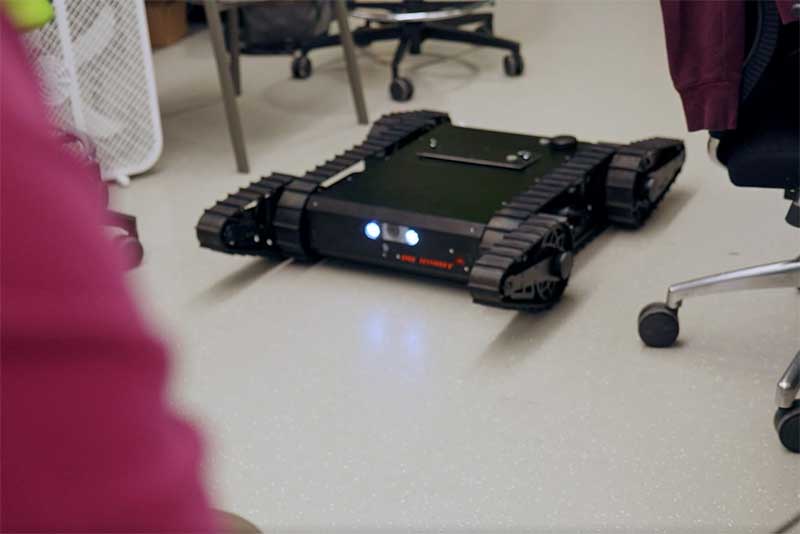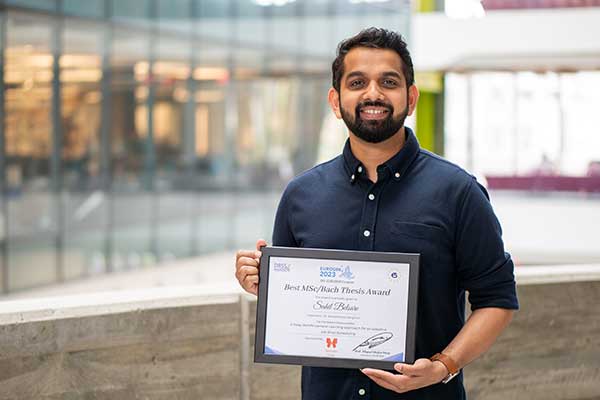
Master of Science in Industrial Engineering
Master of Science in Industrial Engineering
Overview
The Master of Science, MS, in Industrial engineering (IE) applies mathematical modeling and analytical tools to make better decisions for designing and managing efficient and effective systems. IE is applied in many areas, including healthcare systems, supply chains, logistics and transportation engineering, manufacturing, sustainability, resilient systems, energy systems, and human-in-the loop systems.
Innovative Curriculum - Industrial Engineering MS Degree
Partner with organizations ranging from start-ups to well-established corporations, to government and non-government organizations in the MS in Industrial Engineering degree program. For example, our supply chain resilience research is trying to understand and mitigate persistent drug shortages in the United States. Our research in healthcare systems engineering uses methods from lean six-sigma tools to advanced mathematical models to improve system and product reliability and optimize healthcare process quality, delays, cost, efficiency, and effectiveness—national priorities. Recent healthcare applications include improvements in scheduling, readmissions, cost reductions, cancer care, and health services planning. We use stochastic and simulation modeling to study environmental issues related to green manufacturing, product recovery, and end-of-life management. We use data analytics for designing prognostics and preventive strategies for manufacturing operations.
Students accepted into any of the MS programs in the MIE department can choose one of the three options: course work only, project, or thesis.
Students may pursue any MIE program either on a full-time or part-time basis; however, certain restrictions may apply.
Each year the department receives approximately $10 million in funding to pursue use-inspired and fundamental research in many emerging fields that support and enhance our degree programs. Our federally-funded research centers (e.g., Center for High-rate Nanomanufacturing (CHN), a National Science Foundation Nanoscale Science and Engineering Center, and Healthcare Systems Engineering Institute, funded by the Department of Health and Human Services) demonstrate our leadership in key applications that create knowledge and impact society.
Also, view our department research areas.
Over 15 graduate certificates are available to provide students the opportunity to develop a specialization in an area of their choice. Certificates can be taken in addition to or in combination with a master’s degree, or provide a pathway to a master’s degree in Northeastern’s College of Engineering. Master’s programs can also be combined with a Gordon Engineering Leadership certificate. Students should consult with their faculty advisor regarding these options.
- An ability to identify, formulate, and solve complex engineering/scientific/quantitative problems.
- An ability to explain and apply engineering design principles, as appropriate to the program’s educational objectives.
- An ability to produce solutions that meet specified end-user needs with consideration of public health, safety, and welfare, as well as global, cultural, social, environmental, and economic factors.
- An ability to recognize industrial engineering tools/principles needed for in many areas, including healthcare systems, supply chains, logistics and transportation engineering, manufacturing, sustainability, resilient systems, energy systems, and human-in-the loop systems.
Gordon Institute of Engineering Leadership Certificate
Students may complete a Master of Science in Industrial Engineering in addition to earning a Graduate Certificate in Engineering Leadership. Students must apply and be admitted to the Gordon Engineering Leadership Program in order to pursue this option. The program requires fulfillment of the 16-semester-hour curriculum required to earn the Graduate Certificate in Engineering Leadership, which includes an industry-based challenge project with multiple mentors. The integrated 32-semester-hour degree and certificate will require 16 hours of advisor-approved industrial engineering technical courses.
Engineering Business Certificate
Students may complete a Master of Science in Industrial Engineering in addition to earning a Graduate Certificate in Engineering Business. Students must apply and be admitted to the Galante Engineering Business Program in order to pursue this option. The program requires the applicant to have earned or be in a program to earn a Bachelor of Science in Engineering from Northeastern University. The integrated 32-semester-hour degree and certificate will require 16 semester hours of the industrial engineering core courses and 16 semester hours from the outlined business-skill curriculum. The coursework, along with participation in co-curricular professional development elements, earn the Graduate Certificate in Engineering Business.
Experiential Learning
Northeastern combines rigorous academics with experiential learning and research to prepare students for real-world engineering challenges. The Cooperative Education Program, also known as a “co-op,” is one of the largest and most innovative in the world, and Northeastern is one of only a few that offers a Co-op Program for graduate students. Through this program students gain up to eight months of professional experience employed in their field of interest as part of the academic curriculum, giving them a competitive advantage after graduation.
Program Goals
Our research and teaching together are designed to develop IE practitioners who can work, innovate, and excel in a variety of businesses. These extensive programs and course work allow for the selection of a degree that meets a wide variety of personal and professional goals.
Career Outlook
Industrial engineering positions are expected to grow 14% from 2020 to 2030, faster than the average, according to the US Bureau of Labor Statistics.
Academic Advising
The Academic Advisors in the Graduate Student Services office can help answer many of your questions and assist with various concerns regarding your program and student record. Use the link below to also determine which questions can be answered by your Faculty Program Advisors and OGS Advisors.
Admissions & Aid
Ready to take the next step? Review degree requirements to see courses needed to complete this degree. Then, explore ways to fund your education. Finally, review admissions information to see our deadlines and gather the materials you need to Apply.




